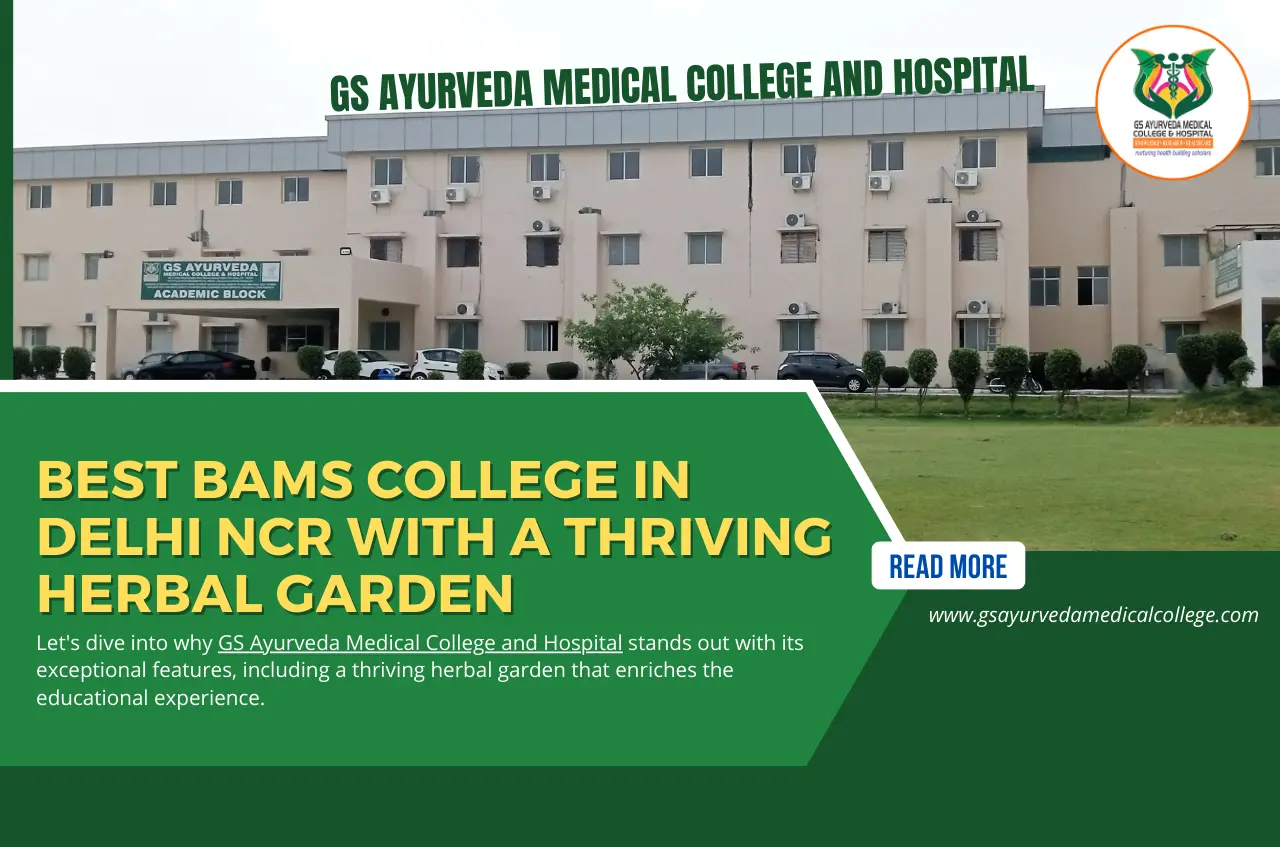
Best BAMS College in Delhi NCR with a Thriving Herbal Garden
Choosing the right college is crucial, especially for a specialized field like Ayurvedic Medicine. If you're looking to pursue a Bachelor of Ayurvedic Medicine and Surgery (BAMS) in the vibrant Delhi NCR region, you're in the right place. Let's dive into why GS Ayurveda Medical College and Hospital stands out with its exceptional features, including a thriving herbal garden that enriches the educational experience.
Nestled in a serene environment, GS Ayurveda Medical College and Hospital stands as a beacon of traditional healing and modern education. The institution not only provides top-notch medical education but also integrates ancient Ayurvedic wisdom into its curriculum. Among its numerous facilities, the Herbal Garden is a unique feature that blends the essence of Ayurveda with practical learning.
What is BAMS?:
BAMS is a professional degree in Ayurveda, an ancient system of medicine that originated in India. It combines traditional Ayurveda with modern medical practices, offering a holistic approach to healthcare.
Importance of Ayurveda in Modern Healthcare:
Ayurveda emphasizes balance in bodily systems and uses diet, herbal treatment, and yogic breathing to maintain health. With growing interest in alternative medicine, Ayurveda plays a vital role in modern healthcare by offering natural and holistic treatments.
Criteria for Choosing the Best BAMS College:
Accreditation and Affiliations:
When selecting a BAMS college, ensure it's accredited by relevant authorities and affiliated with reputable universities. This guarantees the education you receive is recognized and meets high standards.
Experienced Faculty:
A top-notch faculty with extensive experience in Ayurveda and modern medicine is essential. They guide students through the complexities of both traditional and contemporary medical knowledge.
Infrastructure and Facilities:
Modern infrastructure, including well-equipped labs, libraries, and classrooms, enhances the learning experience. Facilities like herbal gardens and patient care centers provide practical exposure.
Research Opportunities:
Research is a cornerstone of medical education. GS Ayurveda Medical College and Hospital offer robust research programs and opportunities for students to engage in groundbreaking work.
Spotlight on Delhi NCR for BAMS Education:
Why Delhi NCR?:
Delhi NCR is a hub of educational excellence, offering a blend of traditional and modern learning environments. Its rich cultural heritage and diverse population provide a unique backdrop for studying Ayurveda. Best Private BAMS Colleges in Delhi-NCR has a vibrant and beautiful Herbal Gardens.
Overview of Top BAMS Colleges in Ghaziabad - GS Ayurveda Medical College and Hospital:
Several prestigious institutions in Delhi NCR offer BAMS programs. They are known for their academic rigor, experienced faculty, and comprehensive facilities, making the region a top choice for aspiring Ayurvedic practitioners.
Introducing the Best BAMS College in Ghaziabad:
College Overview: Among the top contenders, GS Ayurveda Medical College and Hospital, stands out for its excellence in Ayurvedic education and holistic approach to student development. This institution not only meets but exceeds all criteria for a premier BAMS college. The college is one among the Top 10 Private BAMS Colleges in UP.
Key Features: The College boasts state-of-the-art infrastructure, experienced faculty, and a vibrant campus life. However, what truly sets it apart is its thriving herbal garden, an integral part of the educational experience.
The Herbal Garden: A Unique Selling Point:
Significance of a Herbal Garden in BAMS Education:
Herbal gardens have been an integral part of Ayurvedic tradition for centuries. They serve as living libraries of medicinal plants, which are the foundation of many Ayurvedic treatments. But why are they so important today? Let’s delve deeper.
A herbal garden is more than just a collection of plants. It’s a living laboratory where students learn about medicinal plants, their properties, and their uses in Ayurveda. This hands-on experience is invaluable.
Historical Significance:
Historically, herbal gardens were a staple in Ayurvedic practice. Ancient sages and healers cultivated these gardens to ensure a steady supply of fresh herbs for medicinal preparations. These gardens were also centers for learning and research, where knowledge about the healing properties of plants was passed down through generations.
Modern Relevance:
In today’s fast-paced world, herbal gardens hold even more significance. They provide a sustainable source of medicinal herbs, promote biodiversity, and offer a refuge from urban chaos. At GS Ayurveda Medical College and Hospital, the Herbal Garden not only preserves this age-old tradition but also adapts it to modern needs, making it a critical resource for education and healthcare.
Overview of the College's Herbal Garden:
The college's herbal garden is a lush, well-maintained space housing a variety of medicinal plants. It serves as a practical learning area where students can directly interact with the flora they study in textbooks.
Location and Layout:
Strategically located within the campus, the garden is easily accessible to students, faculty, and visitors. Its layout is thoughtfully planned to maximize space and ensure that each plant gets the required amount of sunlight and water. Paths wind through the garden, allowing visitors to explore and learn about the various plants.
Design and Architecture:
The design of the Herbal Garden is a blend of traditional and modern elements. Raised beds, terracotta pots, and stone pathways give it a rustic charm, while modern irrigation systems ensure efficient water use. Informative placards next to each plant provide details about its uses, helping visitors to understand the importance of these herbs in Ayurvedic medicine.
Student Engagement with the Herbal Garden:
Students actively participate in maintaining the garden, learning cultivation techniques, and understanding the therapeutic properties of various herbs. This engagement fosters a deep connection with Ayurvedic practices.
Key Herbal Plants and Their Uses:
The Herbal Garden boasts a variety of plants, each with its own unique medicinal properties. Let’s take a closer look at some of the key plants and their uses.
Medicinal Plants:
Ashwagandha: Known as the "Indian ginseng", Ashwagandha is a powerhouse in Ayurvedic medicine. It’s used to boost energy levels, improve concentration, and reduce stress. The roots and leaves of the plant are typically used to make herbal remedies.
Tulsi: Often referred to as "Holy Basil," Tulsi is revered for its healing properties. It’s commonly used to treat respiratory issues, improve digestion, and boost immunity. The leaves can be made into a tea or used in various Ayurvedic preparations.
Neem: Neem is a wonder plant with a wide range of uses. Its antibacterial, antifungal, and antiviral properties make it a popular choice for treating skin conditions, infections, and even dental issues. Every part of the Neem tree, from leaves to bark, has medicinal value.
Culinary Herbs:
Coriander: Coriander is not just a culinary delight but also a medicinal herb. Its seeds and leaves are used to aid digestion, reduce inflammation, and manage diabetes. It’s a staple in many Indian dishes, adding flavor and health benefits.
Mint: Mint is another versatile herb found in the garden. It’s known for its soothing effect on the stomach and is often used to relieve indigestion and nausea. Mint leaves can be used fresh or dried in teas, salads, and other culinary preparations.
Fenugreek: Fenugreek seeds and leaves are widely used in Ayurvedic medicine. They help in managing blood sugar levels, boosting milk production in breastfeeding mothers, and improving digestion. The plant is also a common ingredient in many Indian recipes.
Academic Excellence at the Best BAMS Colleges in UP:
Curriculum and Courses Offered:
The college offers a comprehensive curriculum covering all aspects of Ayurveda, including anatomy, physiology, pharmacology, and surgery. The courses are designed to provide a balanced education in traditional and modern medicine.
Faculty and Teaching Methods:
The faculty comprises seasoned practitioners and researchers who use innovative teaching methods, including interactive lectures, practical sessions, and research projects, to impart knowledge effectively.
Research and Development Initiatives:
Research Projects: The College encourages students to engage in research projects, exploring various aspects of Ayurveda. These projects often lead to significant discoveries and contributions to the field.
Collaborations and Partnerships: Collaborations with leading research institutions and healthcare organizations enhance the research environment. Students get opportunities to work on joint projects and gain exposure to cutting-edge developments.
Student Life and Extracurricular Activities:
Campus Life: The vibrant campus life includes cultural events, sports, and wellness programs. These activities ensure students have a balanced and enriching college experience.
Clubs and Societies: Various clubs and societies focus on interests like yoga, meditation, and environmental sustainability. These groups provide platforms for students to pursue their passions and develop leadership skills.
Admissions and Application Process:
Eligibility Criteria: To gain admission in BAMS Colleges in Uttar Pradesh, applicants must have a strong foundation in science subjects and a keen interest in Ayurveda. Specific eligibility criteria may vary, so check the college's requirements.
Application Steps: The application process typically involves submitting an online application, along with the NEET score of the same year obtained by the candidate. The candidate is shortlisted on the basis of the marks.
Scholarships and Financial Aid: Many institutions offer scholarships and assistance in obtaining educational loans offered by the banks to the students. There are various government scholarships also available for the under privileged students. This support can significantly ease the financial burden on the BAMS Students.
Alumni Success Stories:
Notable Alumni: The College boasts a network of successful alumni who have made significant contributions to the field of Ayurveda. These graduates often return to share their experiences and guide current students.
Career Paths after BAMS: A BAMS degree opens doors to various career paths, including clinical practice, research, academia, and wellness consultancy. Graduates are well-equipped to excel in diverse roles within the healthcare sector.
FAQs
1. How much time does it take to complete BAMS course?
The BAMS program is for five and a half years, which includes one year of internship.
2. Can I pursue a BAMS degree if I have a background in arts?
No, a science background with subjects like biology, chemistry, and physics is essential for BAMS.
3. Are there job opportunities abroad for BAMS graduates?
Yes, BAMS graduates can find opportunities abroad, especially in countries with a growing interest in alternative medicine.
4. What are the career options available after completing BAMS?
Career prospects include clinical practice, research, teaching, and roles in wellness and health consultancy.
5. How important is the herbal garden in BAMS education?
The herbal garden is crucial as it provides hands-on learning about medicinal plants, enhancing practical knowledge and understanding of Ayurveda.
Conclusion
Choosing the right BAMS College is a pivotal decision that shapes your future in Ayurvedic medicine. The best college in Delhi NCR not only provides top-tier education but also enriches your learning experience with its unique herbal garden. This blend of academic excellence and practical engagement ensures you are well-prepared to embark on a successful career in Ayurveda.

